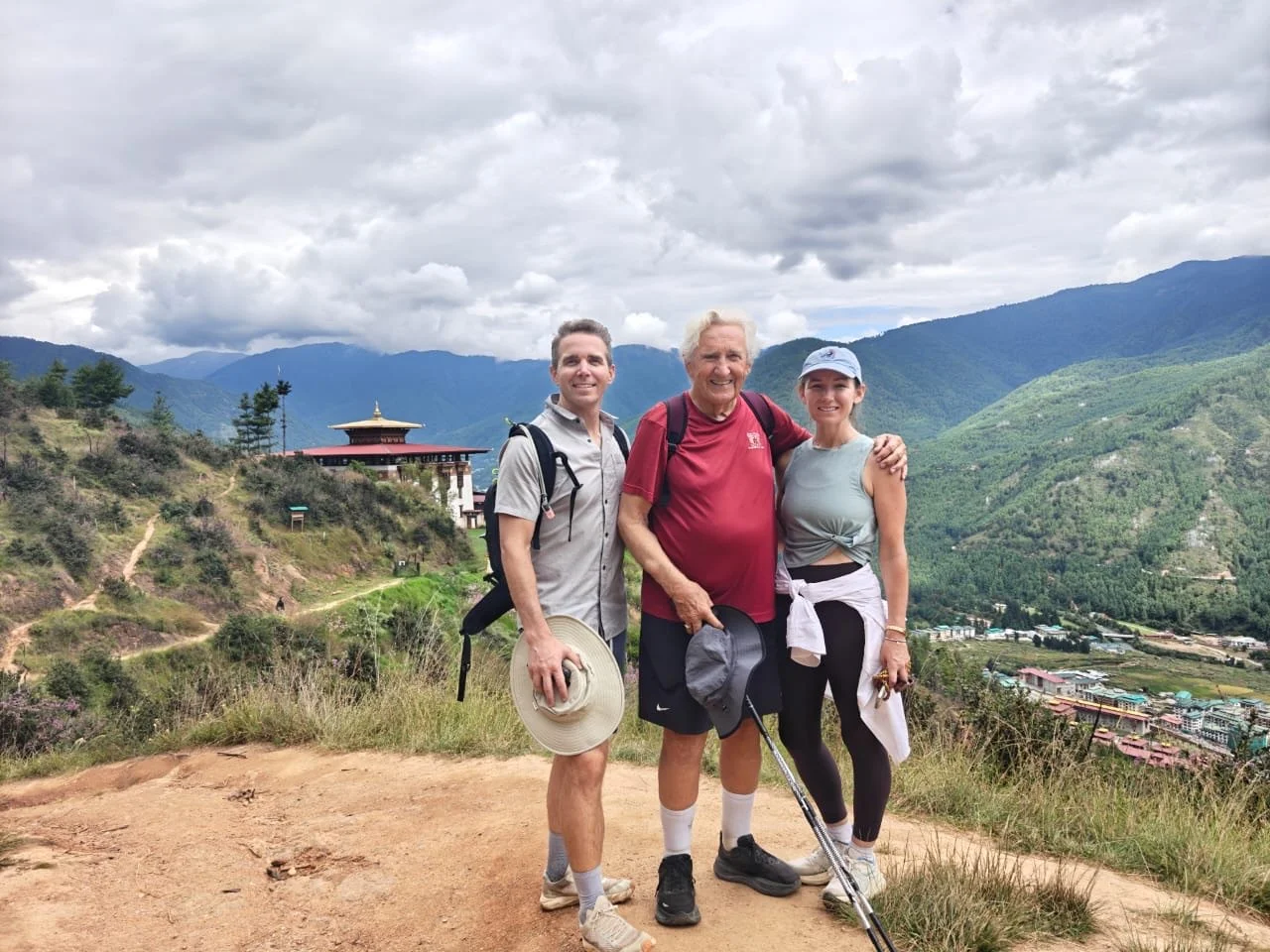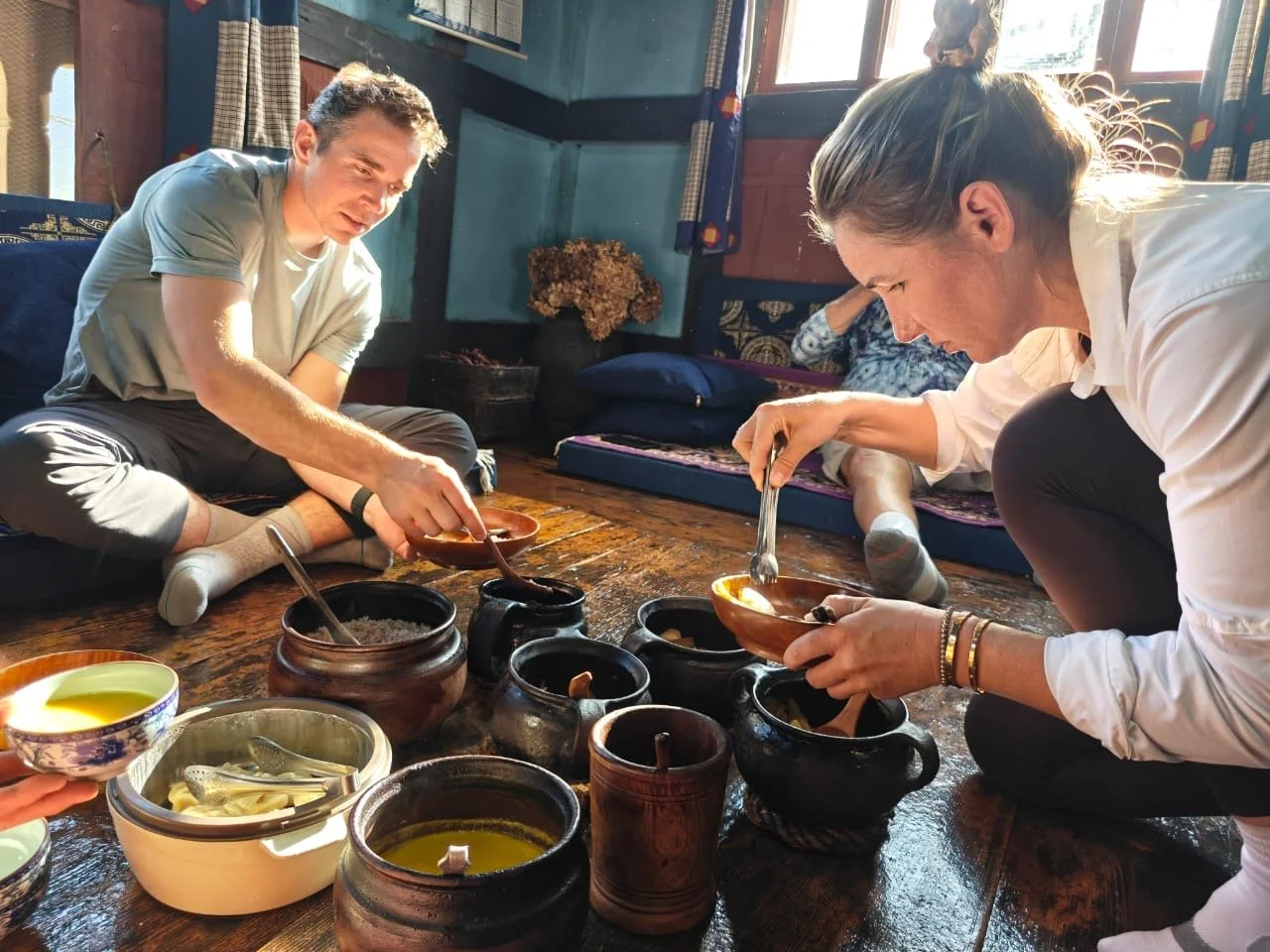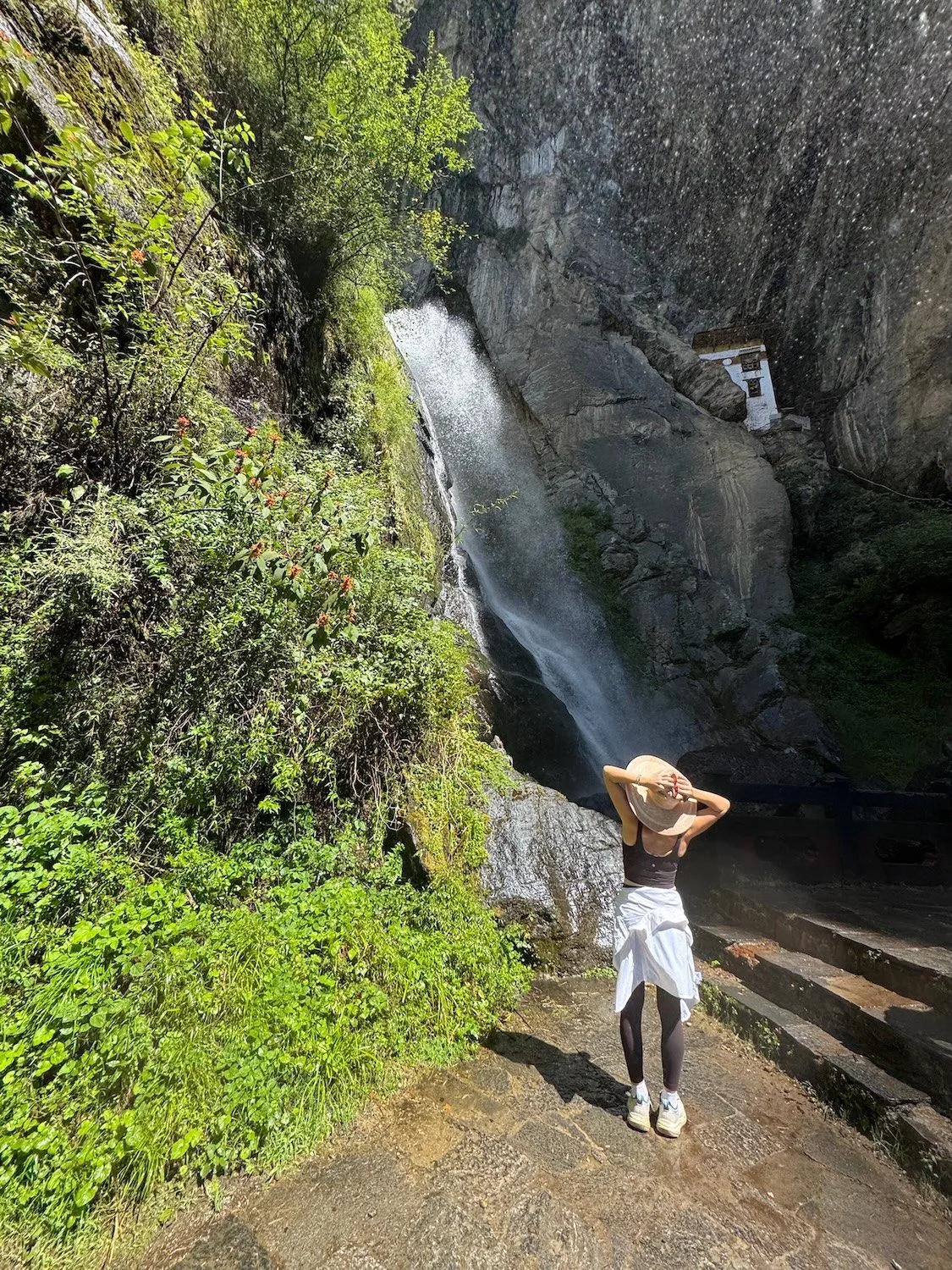Team Peterson in Bhutan
I went to Bhutan without many expectations—just a deep craving for time with my 81-year-old dad and my older brother. I wanted the conversations that happen only when you hike side by side, unhurried. It’s the first trip in 14 years that it’s been just the three of us.
Growing up, that was our rhythm: pick a far-flung place, go as “Team Peterson,” make memories.
Fourteen years ago, Brian proposed. A few days later, I left him—and the new ring—at home to head to India with Dad and my brother. The next year Brian joined us in Morocco, and our trio grew. Then Guy’s fiancée (now wife) and my six-month-old Henry came to Sicily. Later, we added Edie, Guy's kids and recently Dad began a new relationship. Team Peterson expanded in the best way: more love, more life, more logistics. Which is why this return to the original three felt rare and tender. We all sensed it might be the last time in this exact formation. I felt a braid of gratitude and grief—thankful for what we’ve had, and a little heartsore that chapters close even when you’re ready for the next one.
Getting to Bhutan took a 13-hour flight to Dubai. We grabbed a hotel, showers, dinner, and a stroll by the marina before the four-hour hop over the Himalayas. We landed dramatically in Paro, mountains shouldering the runway on both sides. Because of Bhutan’s tourism rules (including a $100 daily fee), we met the guide and driver who’d be with us the whole time.
Bhutan is peaks and valleys, glacier-cold rivers, crisp air. People smiled everywhere. Some wore sweats and graphic tees; many working folks wore traditional dress—wrap skirts with cropped jackets for women, the robe-like gho for men.
On Day 2 we started up the Bumdra trekking route, aiming for camp at 13,300 feet. Dad moved slowly—good and sensible at altitude. After nearly three hours and still not at the lunch stop, he paused, went pale, said his head felt heavy, then dizzy—and fainted forward into Guy. It was a long minute before color returned. Our guide made the call: Dad had to go down—too risky for him and for the team so late in the day, this high. We said we’d turn back too; Dad (stubborn, beloved) wouldn’t hear of it.
The “lunch boys” packed up and brought food down to us. We ate together on the mountainside, then they walked Dad down to the driver and turned right around to head back up. Guy and I continued with the guide to camp. That night, wrapped in quilts with a propane heater sputtering, we shivered through pumpkin soup and local rice, then played round after round of gin rummy until our brains gave out. Our guide kept in touch with the team and hotel; Dad was okay, showered, warm.
Morning broke above the clouds. Tea, fried rice with eggs, faces washed in mountain air. We began the traverse toward Tiger’s Nest while Dad took the more direct, crowded trail—lots of places to rest and swap stories with other pilgrims. We met at the cliffside temple and hugged—a quiet, relieved, grateful hug that said everything.
After Dad headed down the mountain, the pace shifted. With just my brother and me on the trail, we had the air and time to talk about everything—our parents, our kids, our jobs, the choices we’ve made and the ones we’re still making. This is why I love hiking: you focus on your footing, share a goal, and the conversation finds its own honest cadence.
The next few days were a string of small wonders. The three of us visited temples and listened to monks chant in dzongs that have held centuries of prayers. We were lucky to catch a Tsechu festival—color, music, masks, and dance folding the whole community into celebration. Locals shot arrows the length of a football field, calling out hits with cheers; we tried on a tame version and still couldn’t land one. We soaked in hot stone baths, got local massages, wandered markets stacked with bright fruit, vegetables, and handwork. We drove up to a towering seated Buddha overlooking Thimphu and bought little things for the kids and our spouses back home.
On our last full day, we took one more hike. From the Thimphu dzong we wound up the mountainside, then walked about forty minutes along a narrow, mostly level path draped in prayer flags. It opened onto a grassy clearing with panoramic views of the city below. Families picnicked, children ran, music from the cultural festival drifted up on the breeze. In the center sat a small temple—simple, symmetrical, quietly magnetic. My brother and I knew instantly it was our favorite.
We followed the familiar ritual: shoes off, hats off, shoulders covered. Inside, the light was low and warm. Six stone columns held the ceiling; original mandalas darkened to a beautiful patina. A large gold Buddha, aged and gentle, anchored the back wall amid carved details and painted stories. On either side, four stupas—each distinct—stood like sentinels. Our guide prayed three times. We didn’t rush to stand; the room asked us to linger.
A local woman entered and made her way through her own sequence—Buddha, stupas, candle, prayers. One monk serves as caretaker at each temple; here, the monk came in smiling and greeted our guide like an old friend. He knelt in front of us and reached for my dad’s hand. Without breaking eye contact, he asked our guide a few questions, nodding at Dad with a soft laugh. In English he said, “You are very strong. You will live a long life.” He got a basket of strings, returned, and tied a thread around Dad’s neck and wrist: “You will live to 105.” The smile on his face was pure light.
He turned to us as our guide explained we were Dad’s children. He tied strings around our necks too, joking with my brother—“you make good money”—and with me—“so young to have children.” His hands were rough and kind. Something in me gave way; tears sat at the corners of my eyes. He prayed for us, for our families at home, for long, happy lives.
Outside, I let the tears come without analyzing them. We took a photo together by the temple and one with the valley behind us. The hike back was different—quiet, full, like we’d each been given a small, private blessing. We didn’t fill the space with talk; we let the space fill us.
This trip has been an adventure and a reset. I didn’t know what I was looking for in Bhutan, but I found it: steadiness, gratitude, a sense of being held by something larger. I feel ready to go home, to hug my kids tighter, to wrap my arms around Brian, to step back into our wonderfully busy life. I feel extraordinarily lucky—for my dad and brother, for our expanded Team Peterson, and for this pocket of time that brought the three of us together again.






